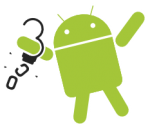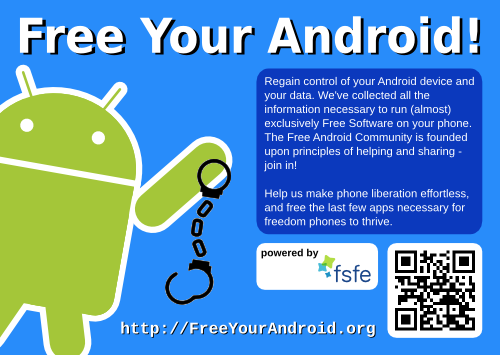Android has a market share of ~70% for mobile devices which keeps growing. It is based on Linux and the Android Open Source Project (AOSP), so mostly Free Software. The problem is that every device you can buy is additionally stuffed full with proprietary software. These programs and apps are missing the essential four freedoms that all software should have. They serve all but your interests and are typically designed to spy on your every tap.
 For this reason, the Free Software Foundation Europe started the Free Your Android campaign in 2012 that shows people how they can install F-Droid to get thousands of apps that respect their freedom. It also shows how it is possible to install alternative versions of Android such as Replicant that are either completely Free Software or in the case of OmniROM, CopperheadOS or CyanogenMod mostly Free Software. Many apps have been liberated and the situation for running (more) free versions of Android has been improved tremendously. You can even buy phones pre-installed with Replicant now.
For this reason, the Free Software Foundation Europe started the Free Your Android campaign in 2012 that shows people how they can install F-Droid to get thousands of apps that respect their freedom. It also shows how it is possible to install alternative versions of Android such as Replicant that are either completely Free Software or in the case of OmniROM, CopperheadOS or CyanogenMod mostly Free Software. Many apps have been liberated and the situation for running (more) free versions of Android has been improved tremendously. You can even buy phones pre-installed with Replicant now.
However, there is an opposite trend as well: The growing proprietarization of Android. There have always been Google-specific proprietary apps that came pre-installed with phones, but many essential apps were free and part of AOSP. Over the past years app after app has been replaced by a non-free pendant. This arstechnica article from 2013 has many examples such as the calender, camera and music app. Even the keyboard has been abandoned and useful features such as swipe-typing are only available if you run non-free software.
 What Google did with the apps, it does even with basic functions and APIs of the Android operating system. They are being moved into the Google Play Services. These proprietary software libraries are pre-installed on all official Android devices and developers are pushed to use them for their apps. So even if an app is otherwise Free Software, if it includes the Google Play Services, it is non-free and will not run anymore on Android devices that do not have the Play Services installed.
What Google did with the apps, it does even with basic functions and APIs of the Android operating system. They are being moved into the Google Play Services. These proprietary software libraries are pre-installed on all official Android devices and developers are pushed to use them for their apps. So even if an app is otherwise Free Software, if it includes the Google Play Services, it is non-free and will not run anymore on Android devices that do not have the Play Services installed.
Still, millions of people have Android devices already and many more will have Android devices in the future. So I think it is time well spent increasing those people’s freedom. Even though Android is more and more crippled it is still a solid base, the community can built upon without having to do their own mobile operating system from scratch without the resources of a large multi-national company.

2 comments
Comments are closed.